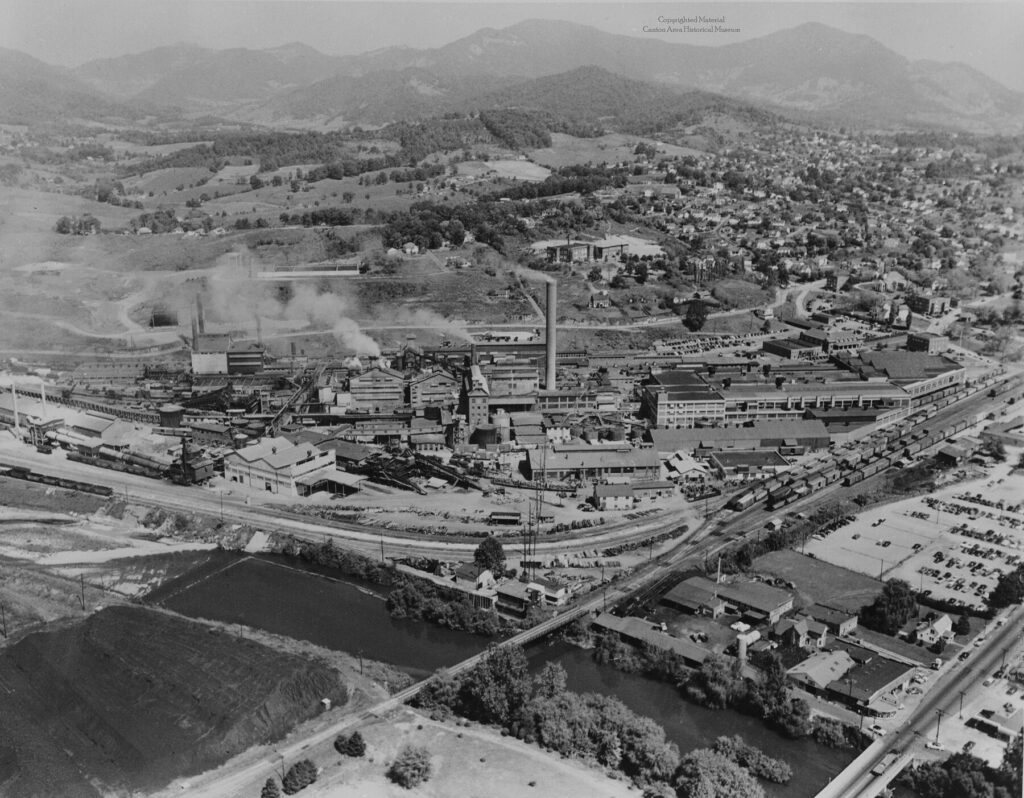This article appeared in the Volume 4, Issue 1 Spring/Summer Winter 2023 issue of the Appalachian Curator. Click here to view a PDF of the full issue.
By Liz Harper (Western Carolina University) and Gene Hyde (UNC Asheville)
When it opened in 1908, the Champion Fibre Company was the largest pulp mill in the world. For 60 years it was under the leadership of Reuben B. Robertson and was a source of employment, a site of innovation, and a hub of community life for the town of Canton. The population of Canton tripled in size between the start of construction and the opening of the mill and the local economy flourished. The presence and economic power of the mill was the driving force for the paving of Canton’s streets, the installation of water and sewer lines, and the establishment of public transportation. The mill shielded Canton from the worst effects of the Clutch Plague. During World War II the mill provided employment for women and jobs were kept waiting for the men who left home to serve. The mill was a leader in the paper industry: was the first mill to make white pulp from chestnut wood, one of the first mills to establish a paper chemistry research laboratory, it installed and operated the world’s largest book-paper machine in 1933, and, by 1934, it had become the first mill to make high-quality white pulp from southern pine.
In addition to its industrial and economic impacts, the Champion Fibre Company played a crucial role in the environmental future of Haywood County. From 1910 to 1913 the mill provided housing and research for Carl Schenck and the Biltmore Forestry School at the Sunburst logging camp. In 1920, Champion hired Walter Julius Damtoft, one of the nation’s first professional industrial foresters and the first trained forester to be employed by a pulping enterprise in the southeast. The mill was also instrumental in the formation of the Great Smoky Mountains National Park, selling over 90,000 acres of land in 1931. Lastly, the mill was active in forestry conservation, allocating over 5,000 acres of its land for reforestation.

Champion was central to life in Haywood County. The mill not only provided economic stability and security but was the linch pin of social life. The major social hub was Canton’s YMCA, built with private funds by Peter G. Thomson, Robertson’s father-in-law and owner of the Champion Coater Paper Company, the mill’s parent company. It opened in 1920 and was the largest facility of its kind west of Charlotte. Robertson donated the land for the Canton Public Library, now home to the Canton Historical Museum, in the 1950s. Snug Harbor, a social center for Champion retirees, opened in 1953. Robertson also donated the land for Camp Hope – a 100+ acre parcel of land that has been open to citizens of Haywood County for over 90 years, although it is currently closed due a catastrophic flood that occurred in August 2021.
On March 9, 2023, the current owner of the paper mill, Pactiv Evergreen, announced it would be closing the Canton plant and a facility in the neighboring town of Waynesville, leaving about 1,200 people unemployed. The mill’s whistle blew for the last time on May 24 and the plant officially shut down on June 8, 2023.

Over the years, Special Collections at both Western Carolina University and the University of North Carolina Asheville have developed collections documenting the Champion mill. This article highlights these collections.
WCU Hunter Library Special Collections staff started working with the Canton Area Historical Museum in 2015 on a new digital collection. The foundation of the collection was a collection of negatives donated by Champion to the CAHM in the 1990s. Over 1,600 photographic negatives that document both mill activities and the town of Canton and are available online. The collection also features over 500 issues of The Log, a newsletter by the Champion Fibre Company which began in 1914 and ran for over 40 years. Additionally, students at WCU did oral histories with mill employees and nearly 30 are online. This fall, an intern will be working to create a web archive of news stories and other materials documenting the closure of the mill and recovery efforts within the region.
UNC Asheville holds two collections that document the history of Champion. The first is the Reuben B. Robertson Collection. Robertson was an attorney but left his practice in Ohion in 1906 when his father in law Peter G. Thompson, founder of the Champion Coated Paper Co. of Hamilton, OH, asked Robertson to go to Canton, NC where the construction of a new Champion paper mill was having problems. Despite it being “a 50-day assignment”, Robertson never left Canton, forgoing a law career to eventually become president and chairman of the Champion Paper and Fibre Company, a position he held for over 50 years
The second is the Walter Julius Damtoft Collection. Damtoft was hired by Champion in 1920 as Chief Forester and Assistant Division Manager of Champion Paper and Fiber Co – essentially becoming one of the first professional foresters hired in the United States, a position he held for over two decades. He was a graduate of Yale Forest School and was associated with members of the Biltmore Forestry School who created what is now known as the “Cradle of Forestry in America” in western North Carolina. The Damtoft collection contains material from his years as a Yale student, some early history of the Biltmore Forest School, which operated from 1898 to 1913 under the leadership of German-born forester Carl Alwin Schenck (1868-1955), and materials that document the broader history of national forests in western North Carolina, especially the Nantahala and the Pisgah national forests.
The closure of the mill with no doubt have a lasting impact on the Town of Canton and all of Western North Carolina, but the residents of Canton are dedicated to preserving the grit and heritage of their identity as a mill town.
Canton Mayor Zeb Smathers reflected on this, saying “we pride ourselves on being a mill town. It’s on our stores; it’s on our children’s jerseys at the high school. Being a mill town is not so much about having a mill and the machinery inside; it’s the people inside. It’s relationships, and it’s the blue-collar workers,” he continued. “Those traits will carry us into the next chapter. This is not the end of this town or this county. It’s the turning of a page and the story of our comeback. We are a blue-collar town that has to fight its way back. We hope our comeback story inspires others, and we look to our sister cities and what they have faced and what they’ve been through. We will find a way forward again; that is what we’ve always done and will always do.”[i]
It is our hope that these collections contribute to preserving that memory and identity.
[i] Rounceville, Z. (2023, June 29). Canton paper mill closure like “a death in the family”. The Carolina Journal. https://www.carolinajournal.com/western-nc-officials-reflect-on-planned-closure-of-paper-mill-in-canton/